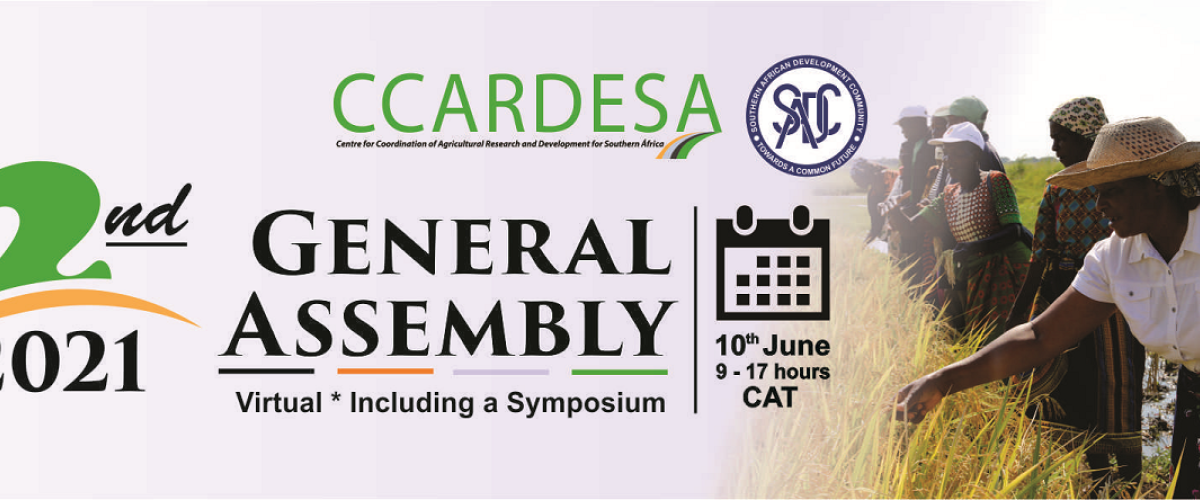
The Centre for Coordination of Agricultural Research and Development in Southern Africa (CCARDESA) which was established by SADC member states through the CCARDESA Charter held its long-awaited 2nd General Assembly (GA) on the 10th of June 2021. The General Assembly (GA), is an essential structure within the governance of CCARDESA and is composed of key agricultural research development stakeholders namely; (a) Ministries responsible for Agriculture and Food Security ; (b) Agro-industry; (c) Agricultural Education Institutions ;(d) Farmer Organisations and; (e) Agricultural Civil Society Organisations. According to the Charter, the GA was supposed to take place every two years after the inaugural one held in 2014. However, this did not take place due to the organisation’s resources constraints. The GA is responsible for providing broad guidance to the CCARDESA Board and ultimately to CCARDESA Secretariat. The key responsibilities of the General Assembly are to:
- Recommend CCARDESA's R&D priorities to State Party Ministers
- Approve, Monitor and Evaluate the CCARDESA strategic direction
- Appoint, renew or terminate the services of External Auditors for CCARDESA
- Recommend to State Party Ministers new members for the CCARDESA Board identified by the sitting Board.
The objective of the 2nd GA was to provide a platform for the organisation's governance structure to perform its mandate as provided in the CCARDESA Charter.
The chairperson for the Board, Prof. Castro Camarada, welcomed the delegates and informed them that the GA was being held at a critical time when CCARDESA had just finalized its Long-term strategy and Medium-Term Operation Plan (MTOP). He reminded the delegates of CCARDESA's mandate of coordinating agricultural research and development in the SADC region, a role it has undertaken with consistency and commitment.
Prof. Camarada also presented the Board’s Report, which informed the delegates that, late last year, CCARDESA commemorated its tenth anniversary which was a significant milestone. Furthermore, that the organisation had grown into a well-governed institution. He also indicated that CCARDESA had made commendable progress and got recognition as a key regional agricultural research partner. He also indicated that CCARDESA had developed a long-term strategic plan to guide program implementation.
Touching on food security issues, Prof. Camarada reminded the delegates to think of practical and feasible ways of producing food to address the food insecurity in the region. He also mentioned that the advent of COVID19 has made people more open to new and innovative ways of food production.
Prof. Camarada thanked the SADC member states for their relentless support, which he was sure had contributed to the growth of CCARDESA. He also thanked all the stakeholders who have been instrumental in shaping CCARDESA to mature into a renowned regional agricultural research and development institution. Dr Camarada was quick to acknowledge the support that CCARDESA gets from the SADC secretariat, where it derives its subsidiary status. He also thanked the Honorable Minister of Agriculture of Eswatini for delegating Mr Similo Mavimbela to deliver his speech during the meeting on his behalf,
The Minister’s speech advised that the GA provided a unique opportunity to share issues affecting agriculture and the human population. He reminded the audience about how the current population of SADC was expected to increase from a 345million to 351 million by 2030. He indicated this would demand an increase in food production. Therefore, the role of CCARDESA to coordinate agricultural research could not have been more appropriate for the region at this critical time. Mr Mavimbela stressed that CCARDESA plays a crucial role and therefore should be supported to ensure seamless coordination of agricultural research.
The CCARDESA Executive Director, Dr Cliff Dlamini, provided the background on CCARDESA’s governance to stakeholders during the GA session. Dr Dlamini detailed the role of the various stakeholders in the CCARDESA governance structure up to how CCARDESA gets strategic guidance from the Ministers responsible for agriculture and food security in the region.
The CCARDESA Grants and Programmes Manager Dr Simon Mwale also presented the long-term strategy's synopsis and its relationship with the Medium-term operation plan and the thematic areas. He gave an overview of the documents before they could be approved for implementation by the GA.
Dr Lefulesele Lebesa, the Director of Agricultural Research from Lesotho who participated in the meeting, expressed gratitude to the Board Chairperson for his presentation. She mentioned how it reminded her of the resilience that CCARDESA exhibited as it went through a challenging episode of its existence. She also confirmed the consultative process of developing the CCARDESA MTOP and Strategic plan in which she also participated.
The delegates approved the Board Chair's report, the Long term strategy and MTOP. The meeting also approved Deloitte Botswana as the CCARDESA's external auditor, who will ensure that procedures and financial regulation are followed.
Dr Lefulesele was elected as the new General Assembly chairperson assisted by Mr Similo Mavimbela from Eswatini. In her speech of acceptance as chairperson of the GA, Dr Lefulesele said that it is an honor to be a chairperson of the GA for an institution like CCARDESA. She commended CCARDESA's work in the region and was happy to be associated with it. She pledged her support to the organisation and promised to do all that is necessary to undertake her duties.
The meeting ended on a high note with the outgoing Chairperson of the General Assembly, Prof. Mick Mwala, thanking CCARDESA for all the great work and support rendered to him as he undertook his duties. He particularly thanked the CCARDESA team for holding the organization together and remained strong when the organisation was traversing a rough tide.






